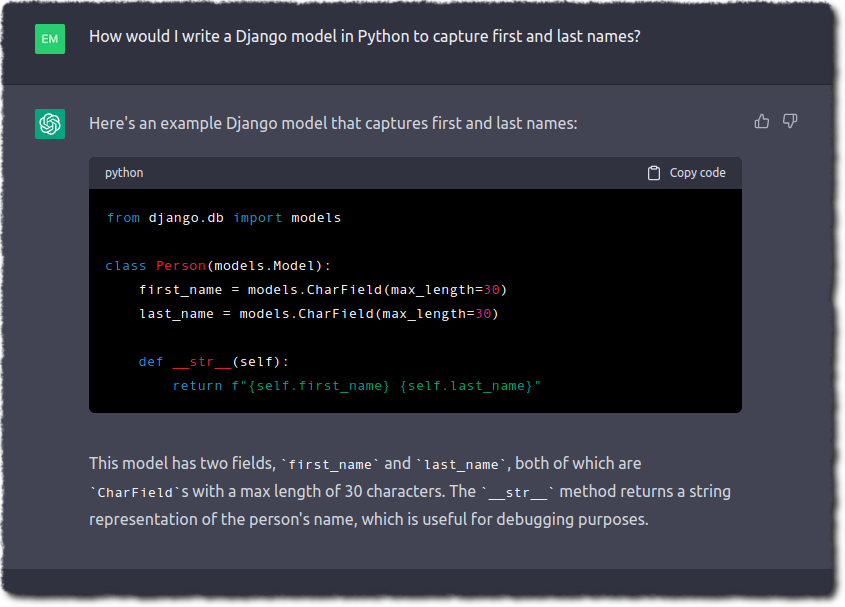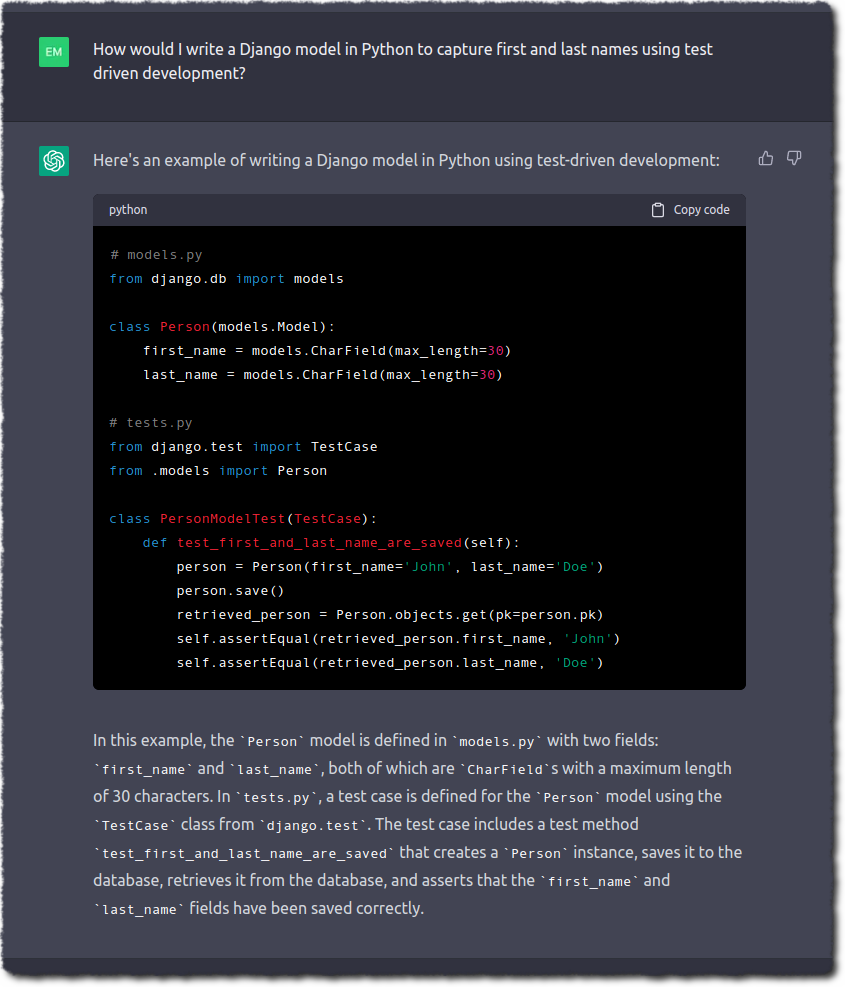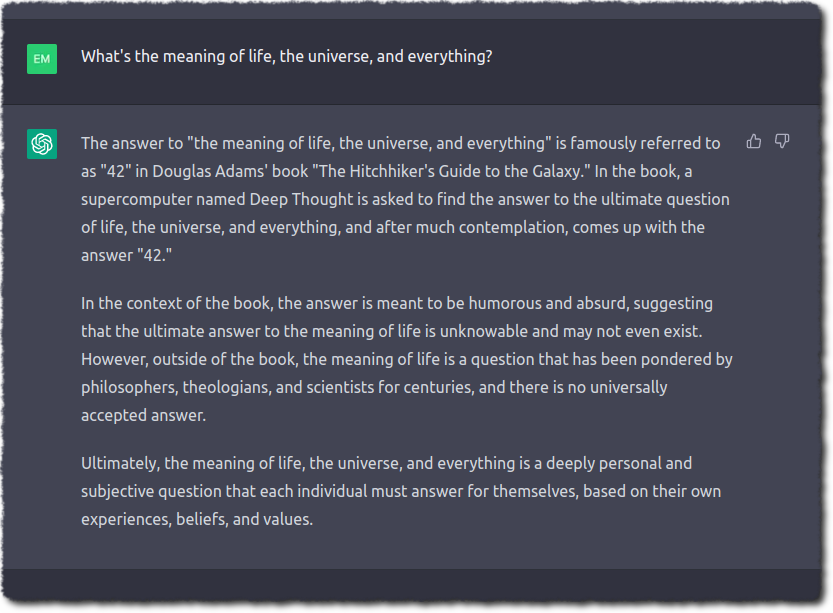Tech pundits have been predicting the end of coders for years. It's always just around the corner. "Next year!", they claim. I don't think they're entirely wrong. The target is there, it's just that the timing is a little off.
The idea of non-programmers writing code isn't new. Nor is the idea of computers writing code. I stopped recommending software coding as a long-term career many years ago. Mostly because it ends up being unfulfilling as a creative process for those who aspire to make something that lasts. But I also had a hunch it wouldn't be needed some day. Twenty years ago, the code profilers and optimizers and modelers were amazingly effective at what they did and it wasn't a stretch to imagine a day when computers would run these things more or less automatically. Today, that's pretty much how it happens. (Here's an example.) Now we have ChatGPT, OpenAI's offering that can take writen language and create code. Here’s a couple of examples...
(NB: ChatGPT seems to prefer answering questions as if it were a conversation.)
How about something a little more challenging and specific?
How about a little more challenging?
ChatGPT has taken an idea and translated it into working code that has no need of improvement by me. All this in less than three minutes. That's impressive. Twenty years ago, this was beyond most people's imagination, even for coders. I could well image a company in the near-future that has some form of ChatGPT running on top of its enterprise data allowing an employee to ask a computer: "Create a job that will collect all the overnight sales figures from the Faceplant ad campaign and have a summary delivered to my inbox by 7 AM the following day." No geeky coder involved to hork up the details.
The job of coder may fade and disappear, but I can foresee the arrival of a new job that serves as a translator for the casual business-speak of the office to the more rigorous requirements of an AI interface sitting on top of enterprise data. The earlier command for a sales report is easier to parse by a computer than something like "Computer, r u abl to deliver data 4 sales and stuff on the ad campaign 4 my team by tomrw?" Maybe someday, but until then it's likely the commands will need the help of someone who understands the constraints of what the AI system needs as input.
Another function that's likely to persist are system designers and architect. AI may be good at generating increasingly complex smaller bits of code, but it's a ways away from putting those bits together into a workable system.
Whatever the future holds, how technical teams function is going to change. There will be less time coding and more time collaborating. And that involves a significantly different set of skills among team members then what is currently practiced.
I grow more and more confident the day is coming when many knowledge workers, including coders, will be replaced by computers just like machine automation has been replacing manual labor since the beginning of the Industrial Revolution. As William Gibson has observed, “The future is already here – it's just not evenly distributed." Chess masters have long since lost the crown of "world's greatest chess player" to programs like IBM's Deep Blue. Today, ChatGPT can already replace virtually any copywriter (ad copy, press releases, news blurbs, etc.) Probably sports writers, too. Crikey, it can undoubtedly replace me already.
What I find particularly interesting is the impact this will have on the legal profession. Criminal law may be safe, but contract and tax law may be more vulnerable. And what might be the consequences of a legal AI system that can find all the contradictions in the hundreds of thousands of pages of criminal and tax law at all levels of government? Are we on the cusp of a system that can untangle local regulations, rules, and codes?
Regardless, I expect the legal profession to vigorously defend their rice bowl. A hint of this was revealed when Joshua Browder, founder of legal services chatbot DoNotPay, announced plans to bring his AI service into the live courtroom. "[W]e got so much pushback from lawyers that we realised it was a distraction," was the official response from Browder when he decided to pull out of the case. In an interview with Fast Company, Browder also had this to say:
"There’s not a lawyer who will get out of bed for a $500 refund. And that’s really where we should focus; so that they don’t come after us for the other stuff, which is a distraction." (Emphasis added)
But maybe this is more a reflection of the incredibly litigious US society. It's been reported that a judge in Cartagena, Colombia, has used ChatGPT to help formulate one of his decisions. If a judge uses AI in formulating a decision, I don't see how it can be argued that a defendant or a plaintiff can be barred from using AI in the courtroom. Perhaps the impact of AI on the legal profession here in the US will come from the outside.
On a positive note, AI will undoubtedly accelerate progress in fields that will still rely on knowledge workers. Biotechnology, for example, would benefit by the identification of newer and more effective medications in significantly less time. There's that whole clean up the law thing, too. Finally, I just had to ask:
Meh. What a cop out.
Image credit: DALL-E 2 (But of course.)








